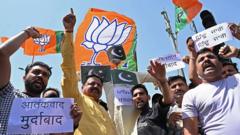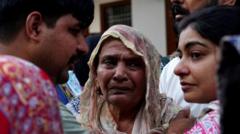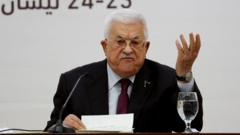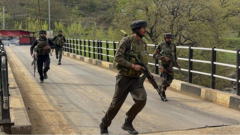The geopolitical landscape intensifies as both nations engage in retaliatory measures after the recent tragedy, which has left at least 26 tourists dead.
**Tensions Escalate as Pakistan Halts Indian Visa Services in Wake of Kashmir Attack**
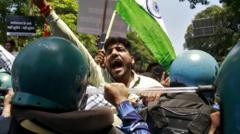
**Tensions Escalate as Pakistan Halts Indian Visa Services in Wake of Kashmir Attack**
In a tit-for-tat response, Pakistan suspends Indian visas following a deadly attack on tourists in Kashmir.
---
Pakistan has enacted immediate visa suspensions for Indian nationals in retaliation for a militant assault that claimed the lives of 26 tourists in Indian-administered Kashmir. This crackdown came as Islamabad expelled Indian diplomats and banned Indian flights through its airspace.
The attack near Pahalgam reportedly involved four suspected assailants, three of whom were linked to the Pakistan-based militant group Lashkar-e-Taiba (LeT). Despite these allegations, Pakistan has dismissed claims of its involvement, asserting that Indian investigations lack credibility and substantive evidence.
Indian Prime Minister Narendra Modi responded with strong rhetoric, pledging unwavering pursuit of the terrorists and their supporters, declaring, “Our enemies have dared to attack the country's soul.” The Indian government also took swift measures, including the immediate closure of the Attari-Wagah border and halting visa services for Pakistani citizens.
Amid this escalating tension, Pakistan reaffirmed the validity of the Indus Water Treaty, warning that any attempts to disrupt water flow would be construed as acts of war. Furthermore, Pakistan's responses included closing its airspace to Indian airlines and downsizing its diplomatic staff in India.
Security measures have ramped up in Kashmir, with around 1,500 people reportedly detained for questioning. In the aftermath of the attack, various sectors, including schools and businesses, have cautiously resumed operations, while police have offered considerable rewards for information leading to the apprehension of the attackers.
As victims' bodies are returned to their homes, emotional farewells ensue across India. However, troubling reports indicate that Kashmiri students are facing harassment in some regions, sparking further concern for communal tensions in the wake of this tragedy.
Pakistan has enacted immediate visa suspensions for Indian nationals in retaliation for a militant assault that claimed the lives of 26 tourists in Indian-administered Kashmir. This crackdown came as Islamabad expelled Indian diplomats and banned Indian flights through its airspace.
The attack near Pahalgam reportedly involved four suspected assailants, three of whom were linked to the Pakistan-based militant group Lashkar-e-Taiba (LeT). Despite these allegations, Pakistan has dismissed claims of its involvement, asserting that Indian investigations lack credibility and substantive evidence.
Indian Prime Minister Narendra Modi responded with strong rhetoric, pledging unwavering pursuit of the terrorists and their supporters, declaring, “Our enemies have dared to attack the country's soul.” The Indian government also took swift measures, including the immediate closure of the Attari-Wagah border and halting visa services for Pakistani citizens.
Amid this escalating tension, Pakistan reaffirmed the validity of the Indus Water Treaty, warning that any attempts to disrupt water flow would be construed as acts of war. Furthermore, Pakistan's responses included closing its airspace to Indian airlines and downsizing its diplomatic staff in India.
Security measures have ramped up in Kashmir, with around 1,500 people reportedly detained for questioning. In the aftermath of the attack, various sectors, including schools and businesses, have cautiously resumed operations, while police have offered considerable rewards for information leading to the apprehension of the attackers.
As victims' bodies are returned to their homes, emotional farewells ensue across India. However, troubling reports indicate that Kashmiri students are facing harassment in some regions, sparking further concern for communal tensions in the wake of this tragedy.



